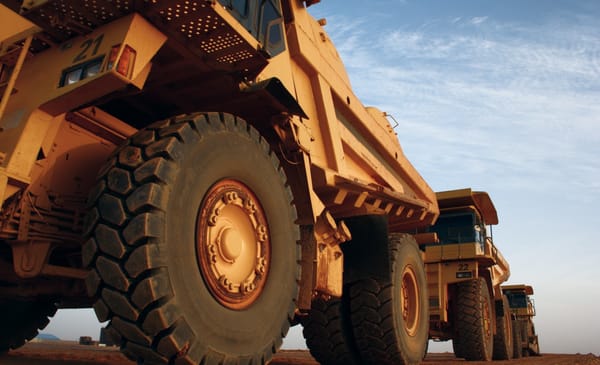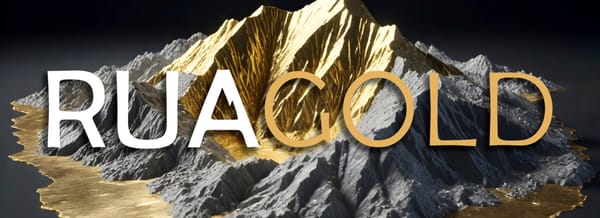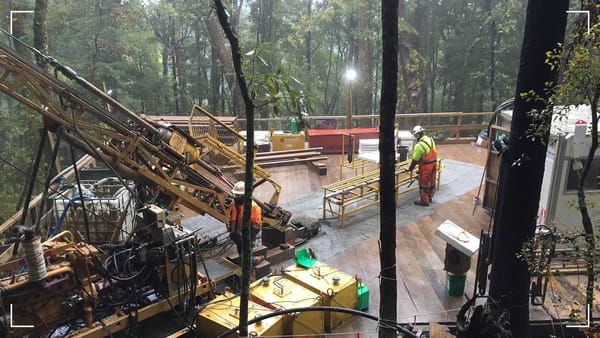Alaska Energy Metals Intersects 317.2 Meters Grading 0.34% Nickel Equivalent, Confirming Mineralization Along 860 Meters Of Strike Length At The Nikolai Nickel Project, Alaska
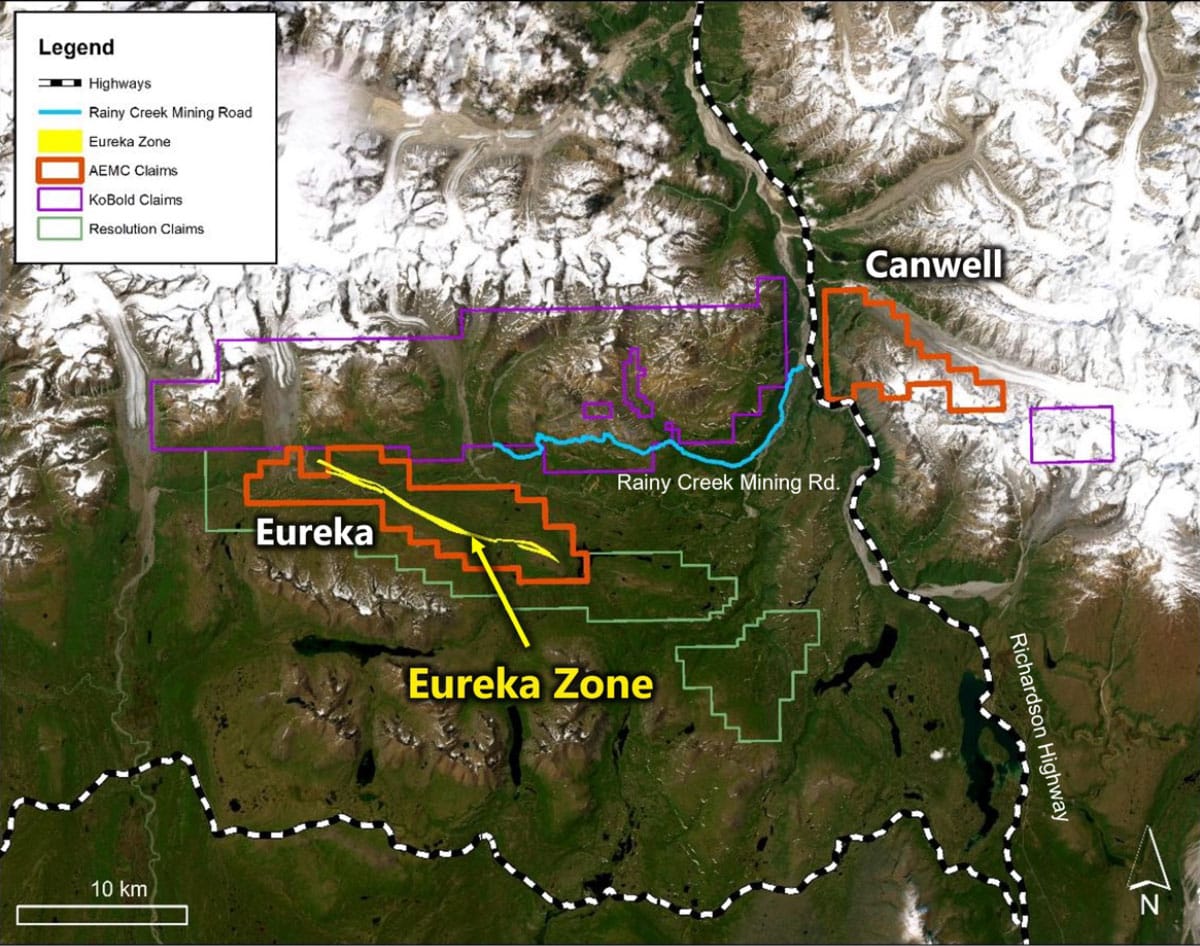
HIGHLIGHTS
- Alaska Energy Metals has received results for two additional diamond drill holes from its 2023 exploration program at Nikolai; in total, assay results for six drill holes have been received and two remain pending.
- Assay results from drill hole EZ-23-004 returned the following downhole intersection: 317.2 meters (m) @ 0.34% Nickel Equivalent (“NiEq”) (0.23% Ni, 0.08% Cu, 0.02% Co, 0.109 g/t Pd, 0.049 g/t Pt and 0.012 g/t Au). The Core Eureka Zone, included in the intersection above, graded 93.0m @ 0.40% NiEq (0.26% Ni, 0.13% Cu, 0.02% Co, 0.34% Cr, 10.51% Fe, 0.164 g/t Pd, 0.069 g/t Pt and 0.020 g/t Au). EZ-23-004 was collared approximately 560m southeast of EZ-23-002.
- Assay results from drill hole EZ-23-006 returned the following downhole intersection: 192.5m @ 0.30% NiEq (0.21% Ni, 0.05% Cu, 0.02% Co, 0.078 g/t Pd, 0.039 g/t Pt and 0.012 g/t Au). EZ-23-006 was collared approximately 300 meters northwest of EZ-23-002.
- The results from holes EZ-23-002, EZ-23-004, & EZ-23-006 confirm the consistency of mineralization spanning 860m of strike length along the Eureka Zone. The mineralization remains open in all directions.
Alaska Energy Metals President & CEO Gregory Beischer commented:
“These two holes further increase the drilled strike extent of the Eureka Zone to 860m. With results from the remaining two drill holes anticipated soon, we can begin calculating an updated Inferred Resource and complete metallurgical studies. Drilling results are consistent with historical drill holes, which intermittently trace out a strike extent of more than 10 kilometers for the mineralized zone. The nickel–copper sulfide mineralization is remarkably homogeneous.”
VANCOUVER, BRITISH COLUMBIA, December 5, 2023 – Alaska Energy Metals Corporation (TSX-V: AEMC, OTCQB: AKEMF) (“AEMC” or the “Company”) today announced assay results from drill holes EZ-23-004 & EZ-23-006.
The holes were drilled as part of the Company’s 2023 exploration program at its 100% owned Nikolai Nickel Project in Central Alaska (Figure 1). Eight diamond drill holes were drilled during the campaign, with results from six holes now received and results from two holes pending.

SUMMARY
- These new results further demonstrate the Eureka Zone remains consistent and homogeneous, as indicated by historical drilling on the property.
- EZ-23-004 was drilled ~560m southeast of EZ-23-002 to test mineralization continuity along strike to the southeast (Figure 2).
- EZ-23-006 was drilled ~300m northwest of EZ-23-002 to test mineralization continuity along strike to the northwest (Figure 2).
- The results from these holes have confirmed mineralization continuity along an 860m strike length on the Eureka Zone, with the mineralization remaining open in all directions.
To date, AEMC has received assay results for six of the eight drill holes completed during the 2023 exploration campaign. Assay results for EZ-23-001 & EZ-23-002 and drill hole locations for the 2023 exploration campaign can be found in AEMC’s October 16, 2023 press release. Assay results for EZ-23-003 & EZ-23-005 can be found in AEMC’s October 30, 2023 press release.
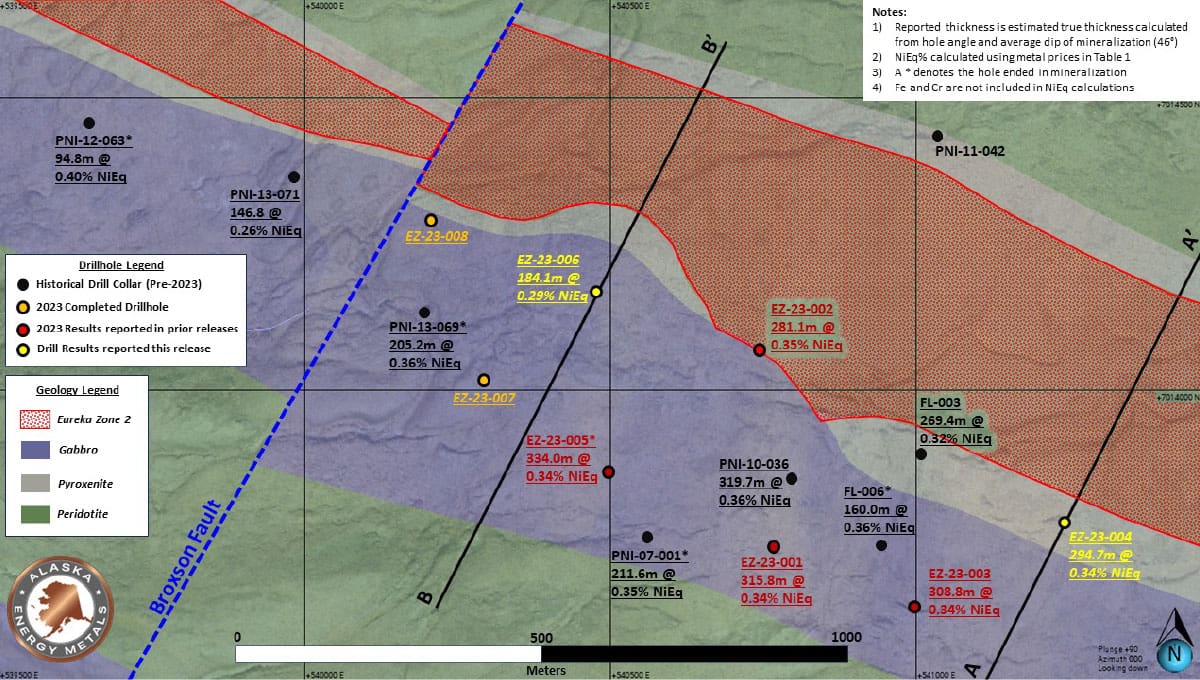
HOLE EZ-23-004 SUMMARY
- EZ-23-004 drilled into 28.9m of overburden and then weakly mineralized pyroxenite-rich unit from 28.9m to 37.9m. The main mineralized Eureka zone was intersected from 37.9m to 355.1m downhole, with assays grading 317.2m (304.9m estimated true thickness) @ 0.34% NiEq (0.23% Ni, 0.08% Cu, 0.02% Co, 0.33% Cr, 10.14% Fe, 0.109 g/t Pd, 0.049 g/t Pt and 0.012 g/t Au) (Table 1 and Figure 3).
- The main mineralized Eureka zone intersection contains a central, higher-grade zone, included in the intersection above, with assays grading 93.0m @ 0.40% NiEq (0.26% Ni, 0.13% Cu, 0.02% Co, 0.34% Cr, 10.51% Fe, 0.164 g/t Pd, 0.069 g/t Pt and 0.020 g/t Au).
- The main mineralized zone was hosted within a pervasively serpentinized peridotite, with varying amounts of disseminated sulfides, with up to 10% disseminated sulfides within the Core Eureka Zone 2. Grades and sulfide abundance within the main mineralized zone decrease near the contact with a pyroxenite intrusive rock phase from 355.1m to 366.7m.
- Disseminated sulfides increase within a serpentinized pyroxenite/peridotite intrusion from 366.7m to 434.3m (EOH). This lower pyroxenite/peridotite unit assayed 67.6m @ 0.23% NiEq (0.16% Ni, 0.03% Cu, 0.02% Co, 0.41% Cr, 10.04% Fe, 0.022 g/t Pd, 0.032 g/t Pt and 0.006 g/t Au) and is still open at depth.
- The mineralization is currently open in all directions.

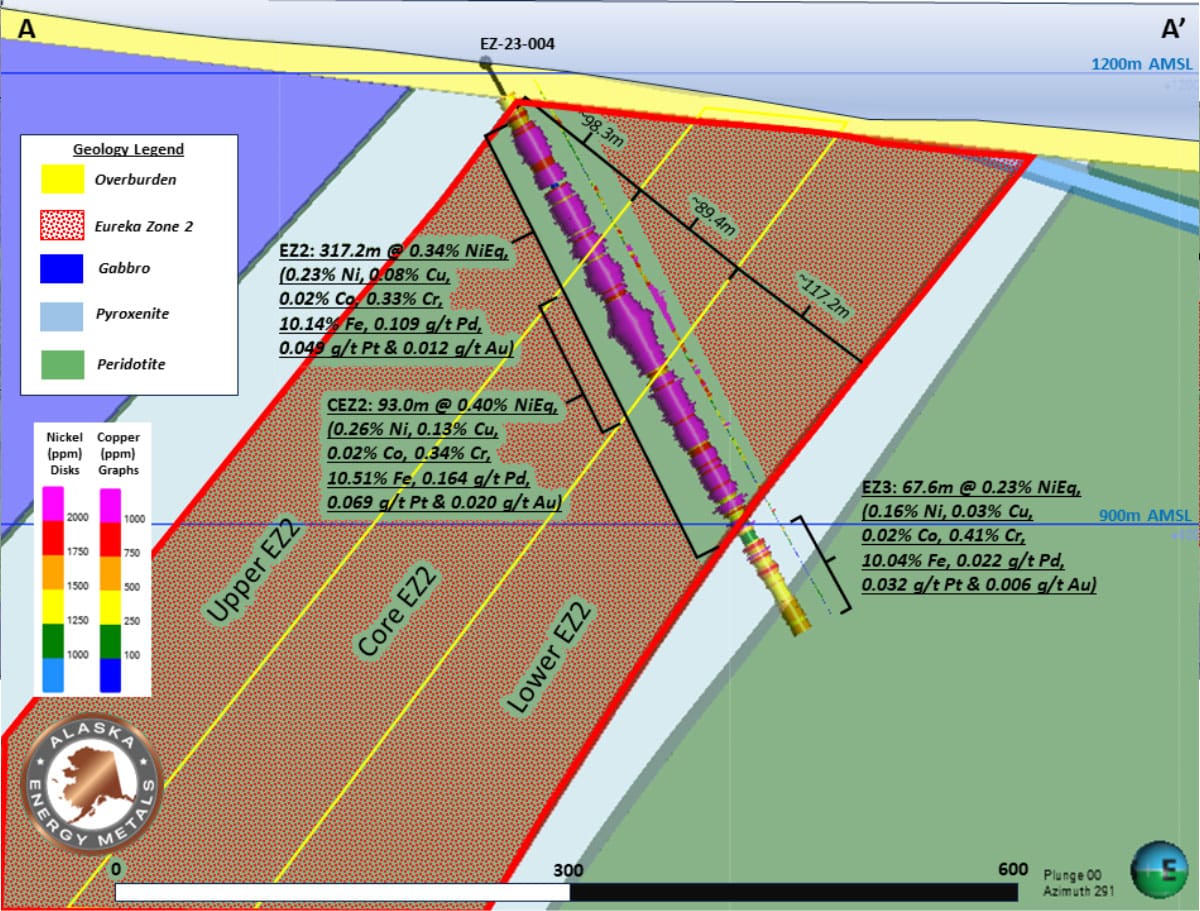
HOLE EZ-23-006 SUMMARY
- EZ-23-006 drilled into 4.2m of overburden and then into a poorly mineralized gabbro from 4.2m to 78.0m. Multiple late-stage porphyritic basaltic dikes were intersected in this gabbroic unit from 7.6m to 64.7m. The gabbroic unit transitioned into a weakly mineralized pyroxenite-rich unit from 78.0m to 129.1m.
- The Eureka zone was intersected from 129.1m to 321.6m downhole, with assays grading 192.5m (184.1m estimated true thickness) @ 0.30% NiEq (0.21% Ni, 0.05% Cu, 0.02% Co, 0.31% Cr, 9.80% Fe, 0.078 g/t Pd, 0.039 g/t Pt and 0.012 g/t Au (Table 1 and Figure 4).
- The main mineralized zone was hosted within a pervasively serpentinized peridotite, with varying amounts of disseminated sulfides. The Core Eureka Zone was not distinguishable in this intercept.
- Disseminated sulfides began to increase within a lower serpentinized peridotite intrusion from 340.2m to 480.7m (EOH). This lower peridotite unit assayed 140.5m @ 0.23% NiEq (0.17% Ni, 0.01% Cu, 0.02% Co, 0.46% Cr, 9.86% Fe, 0.017 g/t Pd, 0.030 g/t Pt and 0.005 g/t Au). EZ-23-006 was the deepest hole drilled into the EZ3 mineralization, with Ni and Cr grades increasing with depth into the lower intrusion. This opens the potential of exploration drilling along the base of the EZ3 mineralization to test for higher grades than seen near the top of the intrusion.
- The mineralization is currently open in all directions from EZ-23-006.
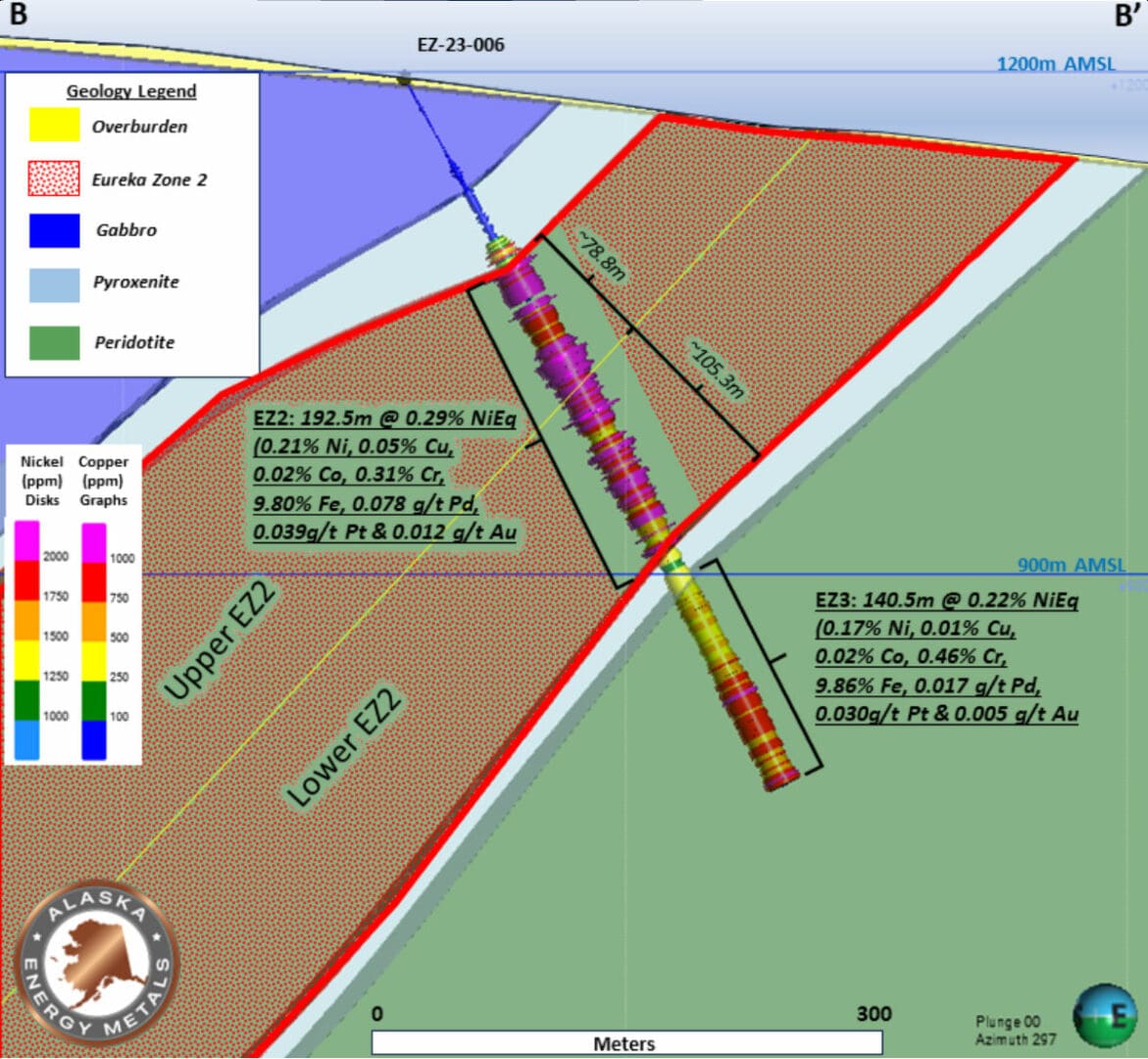
Core Processing & Quality Assurance and Quality Control (QA/QC):
AEMC adheres to stringent Quality Assurance – Quality Control (“QA/QC”) standards for its Nikolai Nickel Project to ensure the best practices for logging, sampling, and analysis of samples. For every 10 core samples, geochemical blanks, coarse reject or pulp duplicates, or Ni-Cu-PGE-Au certified reference material standards (CRMs) are inserted into the sample stream.
Drill core was flown by helicopter daily from drill sites and transported in secured wooden core boxes to the core logging facilities in Delta Junction, Alaska. Detailed logging and sampling data are captured on tablets using MX Deposit software. Samples are labeled by geologists and sawn in half with a diamond blade, with half being inserted into a labeled, bar-coded sample bag. The other half of the core is returned to the wooden boxes for archive. Samples are transported to SGS Laboratories in Burnaby, BC, utilizing a contracted transportation carrier.
Once samples are received at the laboratory, they are weighed, dried, and crushed to 75% passing 2mm. The samples are then riffle split and pulverized to 85% passing 75 microns. The samples are pulverized in a zirconia bowl, to prevent the contamination of Fe and Cr. Au, Pt, & Pd are analyzed by fire assay with ICP-AES finish (GE_FAI30V5). Ag is analyzed using a 4-acid digest with AAS finish (GE_AAS42E50). The remaining 30 elements are analyzed using sodium peroxide fusion with ICP-AES finish (GE_ICP90A50).
Qualified Person:
Gabriel Graf, the Company’s Chief Geoscientist, is the qualified person, as defined under National Instrument 43-101 Standards of Disclosure for Mineral Projects, responsible for, and having reviewed and approved, the technical information contained in this news release.
For additional information, visit: https://alaskaenergymetals.com/
About Alaska Energy Metals
Alaska Energy Metals Corporation is focused on delineating and developing a large polymetallic exploration target containing nickel, copper, cobalt, chrome, iron, platinum, palladium, and gold. Located in central Alaska near existing transportation and power infrastructure, the project is well-situated to become a significant, domestic source of critical and strategic energy-related metals for the American market.
ON BEHALF OF THE BOARD
“Gregory Beischer”
Gregory Beischer, President & CEO
FOR FURTHER INFORMATION, PLEASE CONTACT:
Gregory A. Beischer, President & CEO
Toll-Free: 877-217-8978 | Local: 604-638-3164
Sarah Mawji, Public Relations
Final Edit Media and Public Relations
Email: sarah@finaleditpr.com
Some statements in this news release may contain forward-looking information (within the meaning of Canadian securities legislation), including, without limitation, that (a) will receive all assay results for samples submitted, b) complete metallurgical and deportment studies, and c) calculate an inferred resource based on the drill holes reported. These statements address future events and conditions and, as such, involve known and unknown risks, uncertainties, and other factors which may cause the actual results, performance, or achievements to be materially different from any future results, performance, or achievements expressed or implied by the statements. Forward-looking statements speak only as of the date those statements are made. Although the Company believes the expectations expressed in such forward-looking statements are based on reasonable assumptions, such statements are not guaranteeing of future performance and actual results may differ materially from those in the forward-looking statements. Factors that could cause the actual results to differ materially from those in forward-looking statements include regulatory actions, market prices, and continued availability of capital and financing, and general economic, market or business conditions. Investors are cautioned that any such statements are not guarantees of future performance and actual results or developments may differ materially from those projected in the forward-looking statements. Forward-looking statements are based on the beliefs, estimates and opinions of the Company’s management on the date the statements are made. Except as required by applicable law, the Company assumes no obligation to update or to publicly announce the results of any change to any forward-looking statement contained or incorporated by reference herein to reflect actual results, future events or developments, changes in assumptions, or changes in other factors affecting the forward-looking statements. If the Company updates any forward-looking statement(s), no inference should be drawn that it will make additional updates with respect to those or other forward-looking statements.
Neither the TSX Venture Exchange nor its Regulation Services Provider (as that term is defined in the policies of the TSX Venture Exchange) accepts responsibility for the adequacy or accuracy of this press release.

